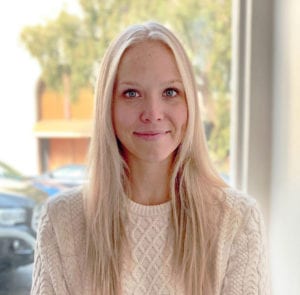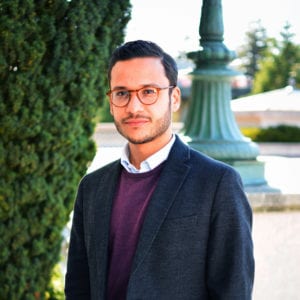Karin Bashir (JD 2020)
Mélina Cardinal-Bradette (LLM 2019)
Jiahui Duan (LLM 2019)
John Hannon (JD 2019)
Andrea Maddox (JD 2019)
Alvaro Pereira (JSD 2019)
Isaac Webb (JD 2020)
Alexandra Zaretsky (JD 2020)
Karin Bashir (JD 2020)
 The American Society of International Law’s Annual Meeting was one of the best experiences I have had in my legal education. I felt like I had a VIP pass to the world cup of international law where I watched the famous players of the international arena present their work and had the chance to meet them.
The American Society of International Law’s Annual Meeting was one of the best experiences I have had in my legal education. I felt like I had a VIP pass to the world cup of international law where I watched the famous players of the international arena present their work and had the chance to meet them.
It was incredible to interact with so many people from such a range of international legal expertise. I attended lectures on the migration crisis, border conflict, human rights and technology, and transitional justice and rule of law in the Middle East – just to name a few. I watched a panel of lawyers with foreign policy backgrounds perform a tabletop simulation on “Atrocity Prevention Decision-Making in the US Government.” I was so positively overwhelmed by the breadth of presentations exploring critical questions facing international law practitioners. It was an opportunity to not only dive deeply on issues I already had interest in, but to also gain exposure to areas of the law that were very new and exciting to me. One of the most interesting sessions explored “Diverse Perspectives on the Impact of Colonialism in International Law.” It opened my eyes to the realm of Third World Approaches to International Law (TWAIL) and the critical importance of seeking out global south voices in order to holistically understand the role of international law in the world today.
One of the best parts of the conference for me was networking with the best and brightest of the international law community. I had the incredible opportunity to speak to professors who are experts in areas of law I am passionate about and legal professionals working in international organizations like the International Organization for Migration, the World Bank, and the United Nations High Commissioner for Human Rights. I met the Egyptian Ambassador Dr. Namira Negm who is the head of legal counsel for the African Union. In addition to the star line-up of panelists, I met students from around the world devoted to studying international law. It barely felt like ‘networking’ because of the wealth of shared interests between conference attendees. People were genuinely excited to hear about one another’s expertise. This ease of socializing was in part due to the many opportunities to meet people through specific interest groups sessions like the “Human Rights Interest Group” and “International Criminal Law Interest Group.” There was also a networking event that connected students to professionals who were specifically interested in being mentors.
I was grateful and proud to represent Berkeley Law at the ASIL conference. It was an amazing experience that confirmed my love for international law and exposed me to many new possibilities in the field. I hope I will have the opportunity to attend it again in the future.
Mélina Cardinal-Bradette (LLM 2019)
 The 2019 ASIL Conference with the theme of “International Law as an Instrument” touched upon how the international legal system can serve as a tool to address some of the world’s pressing issues.
The 2019 ASIL Conference with the theme of “International Law as an Instrument” touched upon how the international legal system can serve as a tool to address some of the world’s pressing issues.
During the four-day conference, I attended panels dedicated to emergent issues that have arisen in the recent years and that are not necessarily comprised under the more traditional scope of international law, such as climate change or technology-related issues.
It was particularly interesting to learn how scholars, lawyers, and advocates use international law principles and mechanisms as a tool and a basis to effectuate change both at a national and international level. On a session about litigating climate change, in which different national litigation strategies were discussed, the panel highlighted how this interaction and influence is conducted. The panel brought up how international organizations, such as the Inter-American Court of Human Rights, that rendered an advisory opinion recognizing the right to a healthy environment as a human right, can serve as a tool for lawyers litigating climate change at a national level. Furthermore, the panel discussed how these national cases also influence one another and how they encourage this global movement of holding governments or corporations accountable for their negative environmental impacts on the population. Finally, this panel explored alternative international law mechanisms to implement change such as how the Permanent Court of Arbitration has advocated for the use of arbitration to resolve climate change disputes, including disputes arising under the Paris Agreement. It was inspiring to understand how this multi-prong approach is necessary to provoke change. While the panel explained the limits of the international legal system, it also stressed how international law is important to set global standards and can serve as a tangible basis for different forms of advocacy and litigation.
Overall, I think my favorite panel was the one about fragmentation in international data protection law that shed light upon the contrasting approaches to data protection in the US and in Europe. The panel made the interesting point that the stakes related to privacy have become increasingly important and the fragmentation of fundamental values and vision between societies have led to a disruption in the laws, preventing a potential multilateral approach to privacy protection. The panel, composed of industry leaders, scholars and NGO representatives tackled the question from different perspectives, highlighting the complexity of regulating this issue, both from a human rights, commercial and transnational angle.
I felt privileged to attend and learn from such interesting conversations about these pressing issues throughout the 2019 ASIL Conference. I am extremely grateful to the Miller Institute for this incredible opportunity.
Jiahui Duan (LLM 2019)
 There is no doubt that attending 113th ASIL Annual Meeting in Washington DC during this spring break was one of the most memorable and enjoyable experiences of the year. Although at the beginning I only applied for the Miller Institute-American Society of International Law (ASIL) Student Fellowship with a tried mindset, I was so delighted that the Miller Institute for Global Challenges and the Law really provided me with this valuable opportunity. I valued this opportunity and I am very grateful for the support from the Miller Institute.
There is no doubt that attending 113th ASIL Annual Meeting in Washington DC during this spring break was one of the most memorable and enjoyable experiences of the year. Although at the beginning I only applied for the Miller Institute-American Society of International Law (ASIL) Student Fellowship with a tried mindset, I was so delighted that the Miller Institute for Global Challenges and the Law really provided me with this valuable opportunity. I valued this opportunity and I am very grateful for the support from the Miller Institute.
This year’s Annual Meeting was held from March 27th to March 30th, and hundreds of lectures were held in just a few days. Participants in the lectures had highly respected professors, government staff who are already in high-ranking positions, researchers who have already achieved fruitful results, and students who are looking forward to their future academic career like me. During the meeting, everyone participated in relevant sessions according to their own interests; during the break, everyone sipped coffee and talked freely about their opinion on some specific topic. Everyone here may not necessarily find someone they know at the beginning of the meeting, but they had definitely found scholars who share their opinions and share their views. Therefore, for me, this meeting was like an academic feast, or it was like an academic forum. It provided a platform for everyone to participate in listening and expression, which allowed everyone in the meeting to share and inspire each other.
During the few days of the meeting, I probably attended more than a dozen sessions. Most of the sessions I attended were related to international human rights and Asian issues. These lectures were also closely related to my research direction. I have to say that I have gained a lot from almost every lecture that I attended. One of the most memorable lectures is “Asia’s Response to the US Indo-Pacific Strategy.” There were five guests in this lecture. The background and thinking angles of each of the lecture guests were very different. Each guest expressed their views on the Asia Pacific strategy, especially the “One Belt, One Road” policy of China. This kind of lecture mode inspired my new thinking on this issue. Because of the different viewpoints, there was the spark of wisdom that collided with each other during the lecture process. This kind of collision, not only for the guest speakers, but also for the audience, was an unparalleled enjoyment.
Of course, I have to mention that in Washington, DC in March, the cherry blossoms were incredible. That was my first time DC, but I think I will definitely go there again to experience the spring of Washington and its unique style.
As an LLM student, I am proud to represent the Berkeley Law School to participate in this conference. I feel sincere pride and glory. Here, please allow me to express my sincere gratitude to the Law School, the Office of the Advanced Degree Program and the Miller Institute for being so supportive!
John Hannon (JD 2019)
 From March 26-30, 2019, I represented Berkeley Law as a Miller Fellow at the American Society of International Law (ASIL) Annual Meeting in Washington DC. Attending the conference was an enormously valuable experience, and I am very grateful to the Miller Institute for sponsoring my participation in the event.
From March 26-30, 2019, I represented Berkeley Law as a Miller Fellow at the American Society of International Law (ASIL) Annual Meeting in Washington DC. Attending the conference was an enormously valuable experience, and I am very grateful to the Miller Institute for sponsoring my participation in the event.
While attending the conference, I met numerous lawyers working in private practice, public interest, NGOs, and academia. I also met many other law students and young lawyers with interests and career plans similar to mine. The concentration of people from different institutions was unlike anything in my experience so far working in international law; I had no idea that it could be so easy to meet people at organizations whose work I admired and had studied in law school. Attending the Annual Meeting transformed my understanding both of nature of the international law field, and of the possibilities for future collaboration with other lawyers.
Attending the ASIL Annual Meeting also provided me with new insights into substantive areas of law that I have been studying at Berkeley Law. At the conference, I attended talks on topics including international criminal law, the law of climate change, natural resources law, and indigenous peoples law. Attending these sessions provided me with a window into the concerns and priorities of major actors in each of these fields. I am currently completing research assignments that deal with several of these topics, and the insights I gained at the Annual Meeting will substantially influence my work.
I would be remiss if I did not mention that the 2019 Annual Meeting took place against a backdrop of unusually strange and troubling international events. Of course, the Trump Administration’s mania for denigrating and abandoning international commitments has been a preoccupation for students of my generation for years now. And the administration’s antagonism towards international institutions did, in fact, feel like a cloud constantly hanging over the conference. But it was also significant that March 29, the date of the conference’s keynote address, had been the date set for Brexit before the first of its postponements.
The Annual Meeting dealt with the weird and confusing trend of “leaving” international agreements head-on. The first major lecture of the conference was delivered by Prof. Martti Koskenniemi of the University of Helsinki. Prof. Koskenniemi and his interlocutor, Prof. Anne Oxford of the University of Melbourne, offered profound and provocative explanations of the development of international law and its discontents over the past century. Two days later, the conference keynote address came from Judge Chile Eboe-Osuji, President of the International Criminal Court – the very International Criminal Court against which the Trump Administration had been railing all March, and whose staff the administration was threatening to bar from the country. Judge Eboe-Osuji offered a long meditation on the achievements of US Supreme Court Justice Robert Jackson in helping to create the field of international criminal law; and ended his speech by inviting the US to resume its place in the international community by joining the International Criminal Court.
I would like to thank the Miller Institute once again for making my attendance at the ASIL Annual Meeting possible. I hope that Berkeley Law students will continue to benefit, as I have, from the Miller Institute’s sponsorship of a delegation to the ASIL Annual Meeting.
Andrea Maddox (JD 2019)
 The first note I scribbled down during the conference says: “global governance no longer seems so inevitable” then “disenchantment → think strategically.” I wrote this during the introductory Grotius Lecture, by Martti Koskenniemi, and for me it embodies the theme of this year’s ASIL Annual Meeting. Prof. Koskenniemi emphasized that “enchantment” with the law should lead to something more worthy of enchantment than the law itself. In other words, we shouldn’t be following rules simply to follow rules. Rather, how can we effectively use international law as an instrument to achieve meaningful ends?
The first note I scribbled down during the conference says: “global governance no longer seems so inevitable” then “disenchantment → think strategically.” I wrote this during the introductory Grotius Lecture, by Martti Koskenniemi, and for me it embodies the theme of this year’s ASIL Annual Meeting. Prof. Koskenniemi emphasized that “enchantment” with the law should lead to something more worthy of enchantment than the law itself. In other words, we shouldn’t be following rules simply to follow rules. Rather, how can we effectively use international law as an instrument to achieve meaningful ends?
I’ve done my best to immerse myself in Berkeley Law’s international offerings. And while these experiences have been highly rewarding, they also have often been frustrating. Compared to domestic law, international law often lacks clarity and capability of enforcement. Further, the global political climate appears increasingly hostile to legal cooperation. In the face of mounting crises, many countries seem to be retreating into isolationism.
Both my inner cynic and inner idealist were inspired at this conference, and I think the contradiction is necessary. The international law community can’t move forward proactively without a realistic approach. We can’t ignore the fact that many leaders are increasingly caring less about international law and cooperation. (In one panel it was asked, “If the UN were created from scratch today, would the US even join?”) Therefore, we must think more strategically about how we are using international law. In many cases, the status quo is proving insufficient.
Two areas in which the need for change seems most apparent are (1) how international law handles non-State actors and (2) how global society is managing climate change. Many of the most serious justice issues lie in the lack of accountability mechanisms for corporate actors and armed opposition groups. And on a more existential scale, if we want any of this to matter in a few generations, we need to collectively figure out a way to solve the climate crisis.
Perhaps global governance no longer seems as inevitable, but I do think it’s necessary, given the modern world we live in and the reality that many of humanity’s biggest problems are not confined within national borders. International law is a way to provide mechanisms to facilitate cooperation and enforce collective resolutions. I left the conference feeling inspired by the many people I heard from. In lectures on topics ranging from the Paris Agreement to corporate liability for human rights abuses, it seems to me that effective tools do exist. I hope that, over these coming critical years, the global community can find a way to refine and increasingly use international law as an instrument to improve the lives of many.
I want to thank very much the Miller Institute for sending me to this thought-provoking conference. It was a privilege to represent Berkeley Law at this year’s ASIL Annual Meeting.
Alvaro Pereira (JSD 2019)
 The American Society of International Law (ASIL) held its 113th Annual Meeting on March 2019 in Washington DC. It was an invitation to reflect on the crisis and the future of international law. Thanks to Berkeley Law and the Miller Institute for Global Challenges and the Law, I had the privilege of attending the event and now the opportunity to share some personal thoughts on what many consider “the end of history” of international law – at least, as we know it.
The American Society of International Law (ASIL) held its 113th Annual Meeting on March 2019 in Washington DC. It was an invitation to reflect on the crisis and the future of international law. Thanks to Berkeley Law and the Miller Institute for Global Challenges and the Law, I had the privilege of attending the event and now the opportunity to share some personal thoughts on what many consider “the end of history” of international law – at least, as we know it.
World governance is in crisis. It is no longer surprising. The growing skepticism on multilateral institutions is unifying large sectors of civil society and elites at a rapid pace, as captured by the spread of cynical headlines and primetime analysis across continents. Paradoxically, the resentment has deeper roots among those that have perceived most of the benefits. Why is it so?
It seems to me that the general distrust in international legal institutions is the result of their success. While supporting efforts to prevent wars, reduce poverty, among other historical human achievements; multilateralism has self-inflicted two chronic wounds. The first is overpromising. The system creates expectations that are often not met – mainly because there is not a comprehensive international legal order, but an amalgamation of regimes that remain permeable to financial interests and political instability. The other wound is the expansion of a global network of technocrats who are expected to reduce collective action problems but are ultimately trapped in the disparities of fragile legal arrangements. Their inability to deliver the system’s promises is often the source of the backlash and, sadly, even invoked to disproof the value of the scientific knowledge that sustains our most ambitious goals.
As means to address the denuclearization lag, ongoing abusive trade practices or impunity for human rights violations; it is tempting to follow the cynical trend and conclude that international law is not worth fixing, that it is either condemned to failure or in need of a complete revolution. However, discussions at ASIL’s Annual Meeting reminded me that there are more reasons to rescue the system than to let it implode, and, in fact, past and present experiences can illuminate a path forward. Martti Koskenniemi, for instance, reminded that, after debunking monarchies, Europeans relied on Roman legal institutions to develop their own. With the same spirit, the history of international law (and not only that of the post World War II institutions) could inform our understanding of global governance and how it can better serve humanity. Contemporary experiences are also enlightening. Balakrishnan Rajagopal noted that innovative approaches to city planning and housing, which emerge from community initiatives and transcend to interdisciplinary global actions, demonstrate that it is possible to build bottom-up rules for human development successfully.
International law is changing, and its future does not belong to internationalists. It belongs to a new generation of lawyers, committed to leveraging its achievements to shape a more representative and better functioning system. I trust that we are ready for the challenge.
Isaac Webb (JD 2020)
 Attending the 2019 ASIL Annual Meeting has been one of the highlights of my time at Berkeley Law. As Co-Editor-in-Chief of the Berkeley Journal of International Law (BJIL), I was thrilled to have the opportunity to attend ASIL’s first International Law Review Editors’ Roundtable at the Annual Meeting. The Roundtable gave me an opportunity to learn about how other international law journals solicit and select scholarship, and foster international law communities at their respective law schools. We also discussed ways to improve and streamline the editing process. In this regard, it was enlightening to hear from legal academics about how they view their engagements with journal editors. Finally, the Roundtable gave me ideas about how to improve BJIL’s symposium next year and in the years to come.
Attending the 2019 ASIL Annual Meeting has been one of the highlights of my time at Berkeley Law. As Co-Editor-in-Chief of the Berkeley Journal of International Law (BJIL), I was thrilled to have the opportunity to attend ASIL’s first International Law Review Editors’ Roundtable at the Annual Meeting. The Roundtable gave me an opportunity to learn about how other international law journals solicit and select scholarship, and foster international law communities at their respective law schools. We also discussed ways to improve and streamline the editing process. In this regard, it was enlightening to hear from legal academics about how they view their engagements with journal editors. Finally, the Roundtable gave me ideas about how to improve BJIL’s symposium next year and in the years to come.
Beyond the Editors’ Roundtable, I am thankful to Miller for being able to attend several days of panels, lectures, and simulations. Of particular interest was a simulation of the atrocity-prevention decision-making process in the US government. The exercise involved a host of former government officials from White House and Departments of State, Justice, and Treasury simulating the inter-agency response to an imaginary atrocity. The event shed light on how and the extent to which agency actors grapple with international law as they respond to political and military crises.
I also had the opportunity to attend several panels that addressed proposed amendments to the International Centre for Settlement of Investment Disputes (ICSID) rules governing investor-state arbitration. Panelists including Meg Kenner, the current Secretary General of ICSID, shed light on the necessity of reform. Kenner discussed ways to address longstanding criticisms of ICSID rules, including the fact that many people view the investor-state dispute settlement process as too slow, costly, and investor-friendly.
It was a tremendous privilege to be able to be able to listen to these discussions, and I am grateful to the Miller Institute for selecting me to represent BJIL and Berkeley Law at the 2019 ASIL Annual Meeting.

Alexandra Zaretsky (JD 2020)
 Attending the ASIL Annual Meeting was an enriching and unparalleled learning experience. I am extremely grateful to the Miller Institute for affording me this incredible opportunity.
Attending the ASIL Annual Meeting was an enriching and unparalleled learning experience. I am extremely grateful to the Miller Institute for affording me this incredible opportunity.
From the first, I was awestruck and intimidated to find myself in the same room as some of the foremost international law scholars and practitioners in the world. Even looking at the program was overwhelming: I wished I could be in two (or three or four) places at once! I struggled to pick between panels, trying to strike a balance between discussions that aligned with my prior experience in human rights and refugee law and panels focused on issues that I knew comparatively little about.
At the same time, my experience at the ASIL Annual Meeting helped reinforce my understanding of the interdisciplinary nature of international law. A discussion of data privacy, framed from a commercial perspective, nonetheless touched on many human rights issues that were familiar to me from my pre-law school work at the human rights organization WITNESS. A panel on Anti-Migrant Border Policy unsurprisingly explored legal questions I was exposed to through my work at the International Refugee Assistance Project last summer, but it also overlapped with questions about extrajudicial killings and third-party liability raised in wholly unrelated contexts through my work with Berkeley’s International Human Rights Law Clinic. A panel on the ongoing crisis in Venezuela raised important questions about the efficacy of sanctions and the intersection of economics, global politics, and human rights. And Marti Koskenniemi’s opening lecture on disenchantment in international law echoed debates about truth, objectivity, and expertise that my professor has repeatedly raised this semester in the context of domestic Administrative Law.
The mood of the ASIL meeting was realistic in its assessment of the current state of international law and the many challenges we face today. At the outset, Mr. Koskenniemi’s lecture questioned what exactly international law was meant to be a tool for – a theme that was extensively probed throughout the next three days. But even amidst this troubling landscape, I found room for hope and optimism in the form of the brilliant panelists and attendees working towards creative solutions. To share just one example, I attended a panel on the state of corporate liability under the Alien Tort Statute following the US Supreme Court’s 2018 decision in Jesner v. Arab Bank. This is an issue I have thought about extensively in the context of my work with the International Human Rights Clinic. Some of the solutions the panelists and audience members suggested were familiar to me from our discussions in clinic, while others – including the opportunities of European litigation – provoked new trains of thought.
As I reflect on the many things I learned over the course of the meeting, I know that what will stay with me is the persistence of international law scholars and practitioners, and their refusal to let disenchantment with international law become a defeat of the ideals that international law stands for.